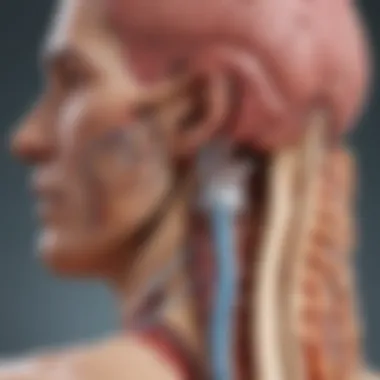Identifying Pituitary Centers of Excellence


Intro
Identifying centers of excellence for pituitary health is crucial for both patients and healthcare professionals. These centers play an important role in improving treatment options, advancing research, and enhancing clinical practices related to pituitary disorders. An understanding of their contributions helps in navigating the complexities of pituitary health management. In this comprehensive overview, we will explore the significance of these institutions, their specialized capabilities, and their impacts on patient outcomes.
Research Overview
Summary of Key Findings
Research into pituitary centers of excellence reveals consistent enhancements in clinical outcomes associated with specialized care. Many of these centers integrate multidisciplinary teams that focus exclusively on pituitary disorders. This approach aids in optimizing patient management by pooling expertise from various fields such as endocrinology, neurosurgery, and radiology. Such collaboration fosters innovative treatment methods and ongoing research that are responsive to patient needs.
Key Highlights:
- Multidisciplinary care maximizes treatment effectiveness.
- Increased patient access to clinical trials and research studies.
- Higher satisfaction rates among patients receiving specialized care.
Background and Context
The pituitary gland, often termed the "master gland," significantly influences various bodily functions by regulating hormone production. Disorders affecting this gland can lead to diverse health issues, ranging from growth disorders to hormonal imbalances. Due to the complexity and rarity of such conditions, specialized treatment centers have emerged, equipped with advanced technologies and experienced professionals. These institutions consistently aim to enhance patient care, education, and research. The establishment of recognized pituitary centers of excellence ensures that patients receive the highest standards of care possible, which is essential for long-term health outcomes.
Methodology
Experimental Design
To assess the effectiveness of various pituitary centers, a range of methodologies can be applied. Comparative studies between patients treated in centers of excellence and those receiving standard care provide insights into the quality of outcomes. The employed design commonly focuses on longitudinal tracking of patient health metrics and quality of life assessments.
Data Collection Techniques
Data collection typically involves both qualitative and quantitative methods. Surveys can gauge patient satisfaction, while clinical data is collected through health records. Comparing surgical success rates and hormonal balance post-treatment also offers valuable insight. Advanced statistical methods help analyze the effectiveness of treatments across different centers, providing clarity on best practices and areas for improvement.
A comprehensive review helps to highlight not only the capabilities of various centers but also their contribution to the broader field of pituitary health.
Foreword to Pituitary Disorders
Understanding pituitary disorders is crucial in the context of endocrine health. The pituitary gland plays a vital role in regulating various hormonal functions and impacting overall well-being. When this small, pea-sized gland malfunctions, it can lead to a range of serious health concerns. Knowing common disorders associated with this gland helps in recognizing symptoms early and seeking specialist help. This article aims to shed light on these disorders, emphasizing the importance of specialized care in diagnosis and management.
Understanding the Pituitary Gland
The pituitary gland is often termed the "master gland" because it controls many of the body's endocrine functions. Situated at the base of the brain, it is responsible for producing hormones that regulate vital processes, including growth, metabolism, and reproduction. The gland consists of two main parts: the anterior and posterior lobes. Each lobe produces different hormones, such as growth hormone, prolactin, thyroid-stimulating hormone, and antidiuretic hormone.
A dysfunction in the pituitary gland can lead to various disorders, which can present with symptoms ranging from fatigue and weight changes to reproductive health issues. Understanding the anatomy and hormone production of the pituitary is vital for anyone dealing with related disorders.
Common Pituitary Disorders
There are several pituitary disorders that patients may encounter. Here is a brief overview of some of the most common:
- Pituitary Adenomas: These are benign tumors that can cause problems by producing excess hormones or exerting pressure on surrounding structures.
- Hypopituitarism: This condition occurs when the pituitary gland does not produce enough hormones, affecting various bodily functions.
- Cushing's Disease: Caused by an excess of cortisol, this condition comes from an adenoma in the pituitary that produces adrenocorticotropic hormone (ACTH).
- Acromegaly: This disorder arises from an abnormal increase in growth hormone often due to a pituitary adenoma, resulting in enlarged body parts.
Learning about these conditions aids in promoting awareness about their symptoms and encourages timely medical interventions.
Importance of Specialized Care
Specialized care is paramount in managing pituitary disorders. Each condition often requires tailored treatment approaches due to the complexity of hormone interactions in the body. A multidisciplinary team typically involved in care includes endocrinologists, neurosurgeons, and radiologists. Such collaboration ensures accurate diagnosis, effective treatment plans, and continued follow-up.
Centers specializing in pituitary disorders often have access to advanced diagnostic tools and the latest treatment options, which greatly enhance patient outcomes. Specialized care not only improves the quality of life but also aids in understanding the significance of ongoing monitoring and support for individuals affected by these conditions.
"Specialized centers are essential in providing the integrated care necessary to manage complex hormonal disorders effectively."
Criteria for Centers of Excellence


Identifying centers of excellence in pituitary health involves understanding a coherent set of criteria. These criteria ensure that such centers are equipped to deliver specialized care to individuals with pituitary disorders. The significance of these criteria cannot be overstated. They serve as a benchmark for evaluating the capabilities and contributions of various institutions in this critical area of healthcare.
Factors such as clinical expertise, research innovations, and patient support services play a decisive role in this assessment. By knowing the specific elements involved, stakeholders including patients, healthcare professionals, and researchers can make informed decisions when seeking care or collaboration.
Clinical Expertise and Specialization
Clinical expertise is foundational to any center of excellence. It encompasses the depth of knowledge among healthcare providers about pituitary disorders. Specialists often include endocrinologists, neurosurgeons, and allied health professionals who work collaboratively to offer comprehensive care. The emphasis lies not only in individual capability but also in the collective experience of the team.
Key aspects of clinical expertise include:
- Formal training specific to pituitary disorders
- Hands-on experience in diagnosing and managing complex cases
- Continuous professional development to stay updated with emerging trends
Specialization allows for tailored treatment plans that address the nuances of each disorder. This is particularly crucial since pituitary disorders vary widely, ranging from benign tumors to hormonal imbalances. A well-defined specialization can significantly affect diagnosis accuracy and treatment efficacy.
Research Contributions and Innovations
Research contributions are integral to identifying a center's excellence. Leading institutions actively engage in groundbreaking studies that not only advance understanding of pituitary disorders but also improve treatment options. Their research often leads to innovations that change clinical practices.
Collaboration with pharmaceutical companies and academic entities enhances their research capacity. Innovative findings can lead to:
- New therapeutic approaches
- Enhanced diagnostic tools
- Improved patient stratification methods
Such research is vital for evolving the treatment landscape. It ultimately shapes the future of pituitary care, making ongoing research a requisite for any center aspiring for excellence.
Patient Care and Support Services
Comprehensive patient care is another essential criterion. Centers of excellence must provide holistic support beyond just medical treatment. This involves a multidisciplinary approach that focuses on comprehensive patient management.
Important components of patient care include:
- Integrated services: Coordination between endocrinologists, surgeons, nutritionists, and mental health professionals to address the various dimensions of patient wellbeing.
- Patient education: Informing patients about their conditions, treatment options, and lifestyle modifications that can enhance their overall quality of life.
- Support networks: Providing access to counseling, support groups, and resources that help patients navigate their healthcare journeys.
"Effective patient care should encompass not only the treatment of the disease but also support for the overall health and well-being of the patient."
List of Recognized Centers of Excellence
Identifying centers of excellence in pituitary care is significant for patients and healthcare professionals alike. Such centers stand at the forefront of research, treatment, and management of pituitary disorders. By focusing expertise in a concentrated manner, these facilities can more effectively address patient needs. The benefits they offer include access to cutting-edge treatments, highly specialized staff, and a commitment to advancing medical knowledge in this area.
In addition to providing top-tier clinical care, centers of excellence contribute to the advancement of research. They engage in clinical trials and publish results, which helps to establish new guidelines for treatment and diagnosis. This integration of research and patient care is crucial for improving outcomes and raising standards in pituitary health.
Center A: Overview and Key Achievements
Center A has built a reputation for excellence through its commitment to patient-centered care and extensive research efforts. Located in a major metropolitan area, it offers a multidisciplinary approach, bringing together endocrinologists, neurosurgeons, and other specialists. The center is known for pioneering minimally invasive surgical techniques, which significantly reduce recovery times and enhance patient outcomes.
One of the center’s key achievements is its involvement in several groundbreaking clinical trials focusing on new medications for hormone replacement therapies. Furthermore, their patient support services, including nutritional counseling and psychological support, address the holistic needs of individuals coping with pituitary disorders.
Center B: Overview and Key Achievements
Center B stands out with its robust educational programs aimed at both healthcare professionals and patients. This center places significant emphasis on training the next generation of clinicians, fostering an environment where continual learning is integral.
Noteworthy achievements include advancements in imaging techniques that improve diagnostic accuracy for pituitary tumors. The center's contributions to research in the field of pituitary adrenal disorders have led to novel treatment protocols, garnering attention from the international medical community.
Center C: Overview and Key Achievements
Center C is recognized for its innovative approach in the treatment of complex pituitary disorders. Their highly specialized team has significantly contributed to the understanding of rare conditions, making them a go-to facility for intricate cases. The center has developed an integrated care model that facilitates seamless collaboration among various specialists.
Key achievements consist of successful outcomes in challenging surgical cases, with low complication rates reported. Their focus on personalized treatment plans based on individual patient profiles sets them apart from conventional practices.
Center D: Overview and Key Achievements


Center D excels in offering comprehensive care specifically tailored to pediatric patients suffering from pituitary disorders. Their unique approach combines dedicated pediatric endocrinologists, endocrinology nurses, and child psychologists to provide a well-rounded support system.
Achievements of Center D include the establishment of a Patient Family Advisory Council, which ensures that patient families have a voice in care delivery and service improvement. Their long-term studies on growth hormone deficiencies have resulted in refined treatment strategies that improve both health outcomes and overall quality of life for younger patients.
Center E: Overview and Key Achievements
Center E focuses on the intersection of research and patient care. It is known for its state-of-the-art research facilities, conducting extensive studies on drug efficacy for pituitary conditions. The center's team frequently collaborates with pharmaceutical companies to facilitate the development of novel therapies.
Among its key contributions is the launch of a patient registry that collects data for ongoing research, continuously updating treatment protocols based on real-world evidence. This approach not only aids in individual patient management but also enhances the overall landscape of pituitary health research.
"Centers of excellence in pituitary care are not just facilities; they are hubs of knowledge, patient advocacy, and innovative research that shape the future of endocrinology".
Research at Centers of Excellence
Research at centers of excellence plays a crucial role in advancing the understanding and treatment of pituitary disorders. These institutions are not only equipped with high-caliber professionals but also with state-of-the-art facilities and resources that help drive innovation in the field. By focusing on research, these centers can develop new therapies and refine existing treatment protocols. This focus elevates the quality of care that patients receive, ultimately improving outcomes.
Furthermore, such centers engage in multidisciplinary research that combines various specialties. This can lead to a broader perspective on treating complex disorders. The collaborative environment fosters a culture of inquiry that encourages physicians and researchers to explore unusual cases and uncover hidden insights.
Some key benefits of research at centers of excellence include:
- Enhanced Treatment Options: With ongoing research, centers can introduce novel treatments and improve patient outcomes.
- Dedicated Funding: Many centers receive grants and sponsorships that allow them to pursue significant studies.
- Patient and Public Engagement: By involving patients in research, centers promote advocacy and ensure that research is aligned with patient needs.
Research is not just an academic pursuit; it has real-world applications. Clinical findings from research can lead to immediate improvements in patient treatment protocols. For example, breakthroughs in hormonal therapies directly affect the way practitioners approach pituitary disorders in clinical settings.
"The synergy between research and clinical practice transforms how we understand and treat pituitary disorders. It is a continuous cycle of learning and improving care."
The importance of this research cannot be overstated. It becomes a resource for developing educational programs for future healthcare professionals, thus emphasizing the cycle of knowledge transfer.
Innovative Treatment Approaches
Innovative treatment approaches are at the heart of what distinguishes research at centers of excellence. These methods often emerge from the research efforts, integrating new pharmaceuticals, surgical techniques, and holistic measures to manage pituitary disorders. The objective is to find more effective methods with fewer side effects to enhance patient quality of life.
For example, centers might develop targeted hormone therapies that provide better control over symptoms with minimal risk. In addition, minimally invasive surgical techniques continue to evolve, making procedures safer for patients.
Furthermore, centers promote individualized treatment plans. By utilizing data from research studies, they analyze specific patient needs and adapt treatments accordingly. This move toward personalized medicine marks a significant shift in how pituitary conditions are managed, incorporating genetic, environmental, and lifestyle factors.
Clinical Trials and Their Importance
Clinical trials are a vital component of research at centers of excellence. They provide pathways to test new interventions and refine existing treatment methods. The importance of clinical trials lies in the rigorous evaluation of treatment efficacy and safety prior to approval for general use.
These trials encompass a range of conditions and potential treatments. Participation in clinical trials allows patients access to cutting-edge therapies that may not yet be available to the wider public. Additionally, clinical trials contribute significantly to medical literature, providing valuable data that can guide future treatment guidelines.
- Phases of Clinical Trials: Each clinical trial follows specific phases, helping to systematically evaluate the effectiveness of treatments:
- Phase I: Safety testing in a small group.
- Phase II: Expanded testing for efficacy and side effects.
- Phase III: Comparison with standard treatments.
In essence, clinical trials ensure that progress in pituitary health is not just theoretical but based on solid evidence. The integration of clinical trials into the research framework amplifies the capacities of centers of excellence to improve patient outcomes while keeping care methods evidence-based.
Patient Experiences and Outcomes
Understanding patient experiences and outcomes is crucial in the context of pituitary care. The effectiveness of treatment not only hinges on clinical success but also significantly on how patients perceive their journey through diagnosis, treatment, and recovery. Positive patient experiences correlate with better adherence to treatment protocols, which ultimately leads to improved health outcomes.
In specialized centers, patients often report feeling more understood and supported. This is particularly important for those dealing with complex pituitary disorders, where traditional medical frameworks might fall short. These centers typically offer a holistic approach that includes emotional support, educational resources, and comprehensive follow-up care. The blend of medical excellence and patient-centered practices fosters an environment that encourages recovery and enhances overall satisfaction.
"Patients who actively engage in their care and feel supported are more likely to achieve better health outcomes."
Case Studies: Patient Success Stories


Case studies serve as powerful illustrations of patient success. These narratives can shed light on the best practices and innovative treatment approaches employed at pituitary centers of excellence. For instance, one patient diagnosed with acromegaly underwent a combination of surgical intervention and medical therapy. At a specialized facility, this individual received not only expert care but also psychological support to combat the emotional challenges associated with the diagnosis.
Such stories not only highlight the capabilities of these institutions but also provide hope for new patients who may feel overwhelmed. The data derived from these cases can also contribute to broader research, helping to refine treatment pathways and improve methods over time. Each success story underscores the importance of personalized care in achieving desired health outcomes.
Quality of Life and Recovery Rates
Quality of life is a pivotal metric in evaluating the effectiveness of treatment for pituitary disorders. Specializing in various treatment modalities, pituitary centers often record recovery rates that reflect not just clinical outcomes but also the patients' ability to resume normal activities and enjoy life post-treatment. Research indicates that patients treated in centers of excellence report improved quality of life metrics than those who are treated elsewhere.
Several factors contribute to this phenomenon:
- Multidisciplinary Teams: Patients benefit from collaboration between endocrinologists, neurosurgeons, psychologists, and other specialists.
- Enhanced Follow-Up Care: Continuous support helps in monitoring progress and addressing any concerns promptly.
- Patient-Centric Programs: Tailored programs are developed to educate patients about their conditions, ensuring they make informed decisions about their health.
In summary, the emphasis on comprehensive patient experiences and outcomes in pituitary care highlights a more nuanced understanding of health. The advancement of treatment not only seeks to manage symptoms but to significantly enhance patients' lives.
By prioritizing these aspects, pituitary centers of excellence play a crucial role in transforming how patients navigate their health journeys.
The Future of Pituitary Care
The exploration of the future of pituitary care is essential for understanding how advancements in medical science can lead to improved outcomes for patients. As research in endocrinology continues to evolve, it paves the way for innovative treatment methodologies. This section considers key elements that will significantly influence the approach to managing pituitary disorders. The integration of advanced technologies and new therapeutic strategies will likely enhance diagnostic accuracy and treatment efficacy.
Emerging Trends in Treatment
The landscape of pituitary care is witnessing several emerging trends that are reshaping treatment paradigms. One notable trend is the increasing use of targeted hormone therapies. These therapies aim to optimize hormonal balance while minimizing side effects. Another important advancement is the development of minimally invasive surgical techniques. These methods often result in shorter recovery times and lower risk of complications.
Additionally, multidisciplinary treatment approaches are gaining traction. Healthcare teams comprising endocrinologists, neurosurgeons, and radiologists contribute to a comprehensive care model that addresses various patient needs. Adopting these trends can lead to significant improvements in patient well-being and clinical outcomes.
The Role of Technology in Diagnosis and Management
Technology plays a vital role in the future of pituitary care. Advanced imaging modalities, like MRI and CT scans, provide detailed views of pituitary tumors and their impact on surrounding structures. These images assist specialists in accurate diagnosis and treatment planning. Furthermore, artificial intelligence is increasingly incorporated into diagnostic processes. AI algorithms can analyze clinical data to predict patient responses, helping tailor individualized treatment plans.
Telemedicine is another critical area of development. Virtual consultations expand access to specialized pituitary care, allowing patients from remote areas to connect with experts. With ongoing integration of these technologies, management of pituitary disorders will become more efficient and patient-centered.
"The future of pituitary care is defined by technology, innovation, and a commitment to improving patient experiences."
In summary, the future of pituitary care is poised for transformation through emerging treatment trends and technological advancements. These changes not only enhance clinical practices but also promote better patient outcomes.
Epilogue
The conclusion of this article encapsulates the critical importance of specialized care in the field of pituitary health. It serves as a reminder of the complexity of pituitary disorders and the necessity for distinct centers of excellence that are equipped to handle the nuances of such conditions. These centers not only provide tailored treatment plans but also foster advancements in ongoing research, ensuring that both the medical community and patients benefit from the latest findings and therapies.
Specialized care enhances patient outcomes significantly. It ensures that individuals receive comprehensive evaluations that consider the multifactorial aspects of pituitary disorders. By concentrating on targeted therapies, these centers improve both the quality of care and quality of life for patients.
Furthermore, the collaboration among different specialties at these centers creates an environment conducive to innovation. This fosters a cycle of learning and improvement, leading to better clinical practices. Each patient's journey is closely monitored, leading to adaptable care strategies that evolve with their needs. This is particularly important as some patients may require multifaceted approaches involving endocrinology, neurosurgery, and psychological support.
Specialization in pituitary care not only benefits patients but also propels the medical field forward through research and innovation.
In summary, recognizing the significance of specialized care paves the path for more informed decision-making among medical professionals and patients alike. It underscores the critical role that centers of excellence play in advancing understanding and treatment of pituitary disorders.
Reflections on the Importance of Specialized Care
Specialized care is a cornerstone in managing pituitary disorders effectively. It encompasses a depth of knowledge and experience that is essential for diagnosing and treating these conditions accurately.
Having a dedicated team that understands the specificities of pituitary health means that patients are less likely to encounter misdiagnosis and ineffective treatments. Such expertise allows these centers to offer state-of-the-art therapies and interventions tailored to individual patient profiles. Moreover, patients benefit from continuity of care, as specialists work collaboratively to provide comprehensive treatment plans.
In addition, specialized care involves continuous education and training for healthcare providers. This commitment enhances their ability to stay current with emerging research and treatment methodologies, ultimately benefiting patient care.
Final Thoughts on Patient Advocacy
Patient advocacy is an integral part of the healthcare landscape, particularly in the context of managing pituitary disorders. It involves empowering patients to take control of their health decisions and ensuring they have access to the necessary resources and support.
Advocacy leads to heightened awareness of pituitary disorders, helping to bridge the gap between patients and medical professionals. When patients are informed and engaged, they are more likely to seek appropriate care and follow treatment plans. Additionally, advocates play a vital role in influencing healthcare policies that benefit individuals suffering from these disorders.
Moreover, the role of advocacy extends beyond individual cases. It is about building communities and networks of support. Whether through online forums or local support groups, the sharing of experiences can relieve the isolation that often accompanies chronic conditions.
Overall, recognizing the importance of both specialized care and patient advocacy can result in better health outcomes and a more supportive environment for those affected by pituitary disorders.







